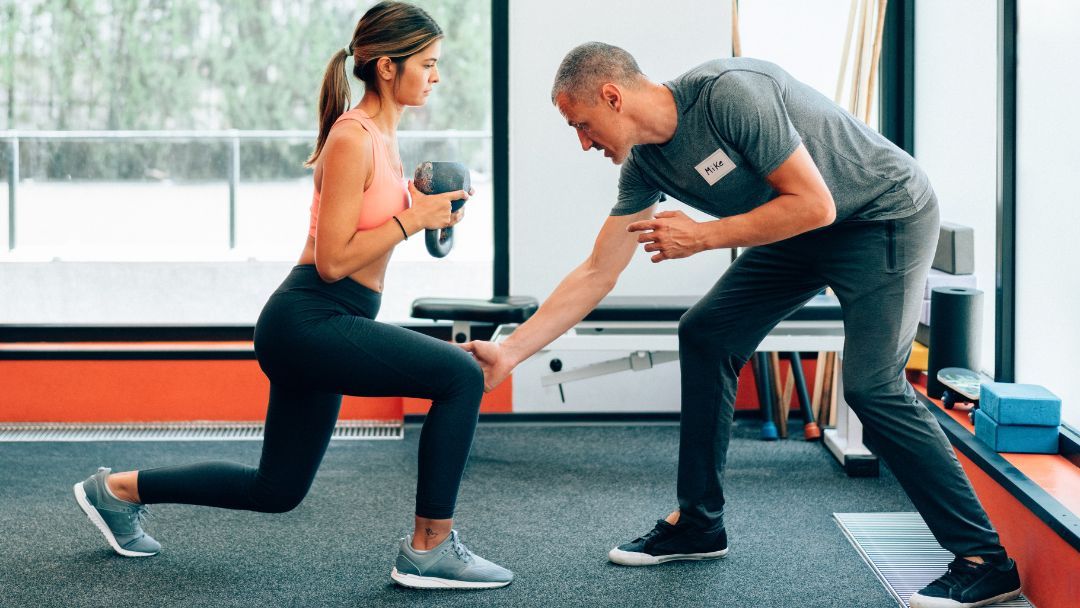Do You Need To Be Fit To Become A Personal Trainer? Know Here

By Pritesh Baviskar
Posted Fri, Dec 22, 2023 | 9 min read
Table of contents
- Do You Need To Be Fit To Become A Personal Trainer
- The Role of a Personal Trainer
- Professional Expectations vs. Reality As A Fitness Coach
- The Importance of Fitness Knowledge Over Personal Fitness
- Client Relationships and Empathy in Personal Training
- Health and Safety Considerations for Personal Trainers

When envisioning a personal trainer, the image that often comes to mind is someone with an impeccable physique, showcasing the pinnacle of physical fitness.
This stereotype leads to a critical question: Is such a level of fitness a prerequisite for those aspiring to become personal trainers?
This blog delves into the heart of what it truly means to be a personal trainer, moving beyond the surface of physical appearance.
Do You Need To Be Fit To Become A Personal Trainer
When discussing the fitness industry, 'fitness' is a term that often conjures images of super fit bodybuilders or marathon runners.
However, this term takes on a broader meaning. Fitness is not just about having a sculpted physique or the ability to lift heavy weights. It encompasses various aspects such as cardiovascular health, muscle strength, flexibility, and even mental well-being.
For many personal trainers, fitness goals are as diverse as their clients.
A successful personal trainer recognizes that fitness is a personalized journey. Whether working with clients in a gym setting or through online PT sessions, the trainer’s role is to help them reach their goals, which may vary significantly from one client to another.
Thus, the level of fitness a personal trainer needs may differ based on the type of clientele they serve.
While a personal trainer specializing in bodybuilding might need to demonstrate exercises with heavy lifting, a trainer focusing on healthy lifestyle and fitness for seniors might prioritize demonstrating exercises that enhance flexibility and balance.
In this light, personal training certification programs often emphasize a good understanding of exercise science, motivational skills, and emotional intelligence over the trainer's personal fitness level.
These qualifications ensure that personal trainers come in all shapes and sizes, each bringing their unique strengths to the table.
The Role of a Personal Trainer

The role of a personal trainer extends far beyond the walls of a gym or fitness facility. It's a multifaceted profession that involves more than just instructing exercises.
Here are key aspects of what a personal trainer does:
- Customizing Exercise Routines: Tailoring workout plans to meet the individual fitness and nutrition needs of clients, considering factors like age, health status, and fitness goals.
- Motivational Support: Offering the emotional and motivational support necessary to help clients stay on track with their fitness journey.
- Educating Clients: Providing clients with the knowledge they need about healthy eating, proper exercise techniques, and maintaining a healthy lifestyle.
- Tracking Progress: Monitoring the progress of clients, making adjustments to their exercise routines as needed to ensure they continue to move towards achieving their goals.
- Safety and Injury Prevention: Ensuring exercises are performed safely to prevent injury, this might involve modifying exercises to accommodate physical limitations.
A personal trainer may work in gyms, operate as a self-employed individual, or even offer services online as an online PT.
Their ability to adapt and cater to the diverse needs of their clients is what makes them successful.
The role is not just about being fit enough to demonstrate the exercises; it's about having the communication skills, empathy, and knowledge to effectively guide clients on their fitness journey.
In this context, the need to be fit as a personal trainer is less about personal physique and more about having the energy and capability to meet the diverse needs of clients.
Whether it's lifting weights with one client or focusing on gentle yoga with another, the versatility in skills is what defines a successful personal trainer.
Professional Expectations vs. Reality As A Fitness Coach
The fitness industry often portrays personal trainers as epitomes of physical perfection, but this image doesn't always align with reality. Let's compare the common expectations with the actual requirements of being a personal trainer:
| Expectation | Reality |
|---|---|
| Super Fit Physique | Diverse Body Types |
| - Often seen as a requirement. | - Trainers come in all shapes and sizes. |
| - Associated with credibility. | - Credibility comes from knowledge, empathy, and ability to inspire. |
| Constantly Demonstrating High-Intensity Workouts | Varied Exercise Demonstrations |
| - Belief that trainers should always be able to perform intense workouts. | - Demonstrations vary based on client needs, including low-intensity routines. |
| One-Size-Fits-All Approach | Personalized Training Methods |
| - Assumption that all trainers use similar methods. | - Training methods tailored to individual client’s goals and fitness levels. |
This table highlights the contrast between what many people assume about personal trainers and the reality of their profession.
Successful personal trainers understand that it's not about being super fit or showcasing a certain type of physique.
Instead, it's about being qualified personal trainers who can cater to the varied needs of their clients, regardless of their own level of fitness.
The fitness level of a personal trainer may not always reflect their ability to help others achieve their goals.
It's their understanding of fitness and nutrition, ability to motivate, and dedication to helping people reach their goals that make them effective.
The Importance of Fitness Knowledge Over Personal Fitness
The effectiveness of a personal trainer is rooted more in their knowledge and skills than in their personal fitness levels.

- Expertise in Exercise Science: A deep understanding of Kinesiology and exercise science enables personal trainers to design effective, safe workout programs. This expertise is often gained through personal training certification and continuous education.
- Nutritional Guidance: Knowledge of healthy eating and nutrition plays a crucial role in helping clients achieve their fitness goals. A personal trainer provides guidance on diet that complements their exercise routines.
- Adapting to Client Needs: Trainers must be adept at modifying exercises to suit various fitness levels and physical limitations, a skill that comes from an understanding of human physiology and fitness principles.
- Injury Prevention: An in-depth knowledge of body mechanics helps in preventing injuries during training sessions. Trainers use this knowledge to teach proper form and technique.
- Behavioral Coaching: Understanding the psychological aspects of fitness, such as motivation and habit formation, is essential for helping clients stick to their fitness routines.
Consider the following examples of how knowledge trumps personal fitness in different scenarios:
| Scenario | Application of Knowledge |
|---|---|
| Client with Specific Health Issues | Designing a program that addresses the client's health constraints while effectively working towards their goals. |
| Elderly Client | Implementing low-impact exercises focusing on balance, flexibility, and strength appropriate for older adults. |
| Athlete Looking for Performance Enhancement | Creating a high-intensity, sport-specific program that maximizes performance while minimizing injury risks. |
These scenarios show that the role of a personal trainer is less about showcasing personal fitness and more about applying fitness knowledge to help clients of all types achieve their goals.
It's this expertise and adaptability that define a successful personal trainer.
Client Relationships and Empathy in Personal Training
The bond between a personal trainer and their clients is pivotal for success in personal training.

This relationship is built not just on fitness expertise but also on empathy and understanding. Empathy helps with-
- Building Trust: Clients often share personal challenges and insecurities with their trainers. Empathy helps in building a trusting relationship, crucial for client retention and success.
- Tailoring Motivation: Each client is motivated differently. Understanding their unique drivers and barriers allows trainers to provide personalized motivational strategies.
- Adapting Communication: Effective communication, tailored to each client's needs and preferences, enhances the training experience and fosters a positive environment.
Empathy in personal training often stems from the trainer's own fitness journey.
Trainers who have navigated their own challenges in reaching fitness goals or overcoming obstacles can better relate to their clients’ struggles.
This shared experience can be a powerful tool in motivating and guiding clients.
Consider these examples where empathy plays an important role-
- A Client Struggling with Weight Loss: An empathetic trainer acknowledges the emotional aspects of weight loss, offering support and understanding while guiding the client through setbacks.
- A Client New to Fitness: For someone who is new to the gym, a supportive and patient approach can make a significant difference in their comfort level and commitment.
Empathy and emotional intelligence are often as important as technical knowledge in personal training.
They allow trainers to connect with clients on a deeper level, helping them feel understood, supported, and motivated.
Health and Safety Considerations for Personal Trainers
A certain level of fitness is important for personal trainers, not just for their own health, but also to effectively perform their job.
Trainers need to be physically capable to handle various aspects of their role, from demonstrating exercises to maintaining energy throughout the day.
It's not about having a bodybuilder's physique or running marathons, but about being healthy and fit enough to meet the demands of the job and ensure client safety.
Below are key health and safety considerations every personal trainer should keep in mind:
- Demonstrating exercises with correct form and technique.
- Maintaining endurance for long workdays with multiple clients.
- Preventing personal injuries, especially when spotting or demonstrating.
- Being physically capable of responding to client emergencies.
- Sustaining mental alertness and focus during training sessions.
- Adapting training techniques to a variety of exercise modalities.
- Keeping energy levels high to motivate and engage clients.
These considerations highlight that a moderate level of fitness is essential for the practical aspects of personal training.
The goal is to balance personal health with professional effectiveness, ensuring both the trainer and their clients can achieve their goals safely and successfully.
Conclusion
In answering the question, "Do You Have To Be Fit To Become A Personal Trainer?" we find that the essence of personal training extends beyond personal fitness.
It's about expertise, empathy, and the ability to guide others on their fitness journey.
While maintaining a reasonable level of health is important, a trainer's true effectiveness lies in their knowledge, teaching skills, and ability to connect with clients.
The diverse world of personal training welcomes all who are passionate about fitness and helping others, regardless of their own physique.

I'm one of the founders at CoachGenius. As someone with a genuine understanding of the online coaching landscape, I'm no stranger to the challenges faced by personal trainers. I like to write about goal setting techniques, building personal brand and creating engaging online content related to fitness.
